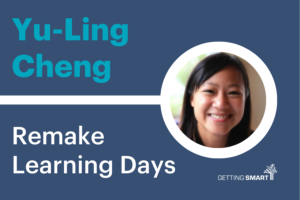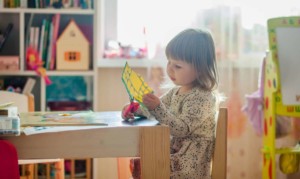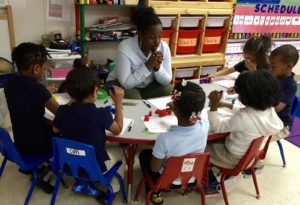Why Early Childhood Education Matters Now More than Ever

By Tammy Kwan
AI-powered technology can help the future workforce have more creative and fulfilling careers. But as the world continues to change at an ever-faster rate, how can we best prepare the next generation to flourish in this new economy? Moreover, how can we do it equitably?
According to a recent White House report on AI and the economy, the key is early education:
“All children [need to] get off to the right start with access to high-quality early education. In a world of AI-driven skill-biased technological change, people with low levels of even basic skill such as reading and math are at higher risk of displacement.”
Can learning “in the cradle” actually impact a child’s career? Research shows that early childhood experiences have lifelong impacts. Vocabulary size at 24 months predicts academic and behavioral performance in kindergarten, three years later, even after controlling for many other variables. Kindergarten skills go on to predict later reading and math achievement, as well as life outcomes such as earnings at age 27, home ownership, and retirement savings.
What can parents do to ensure their child is off to the best start? Parent-child communication is key. Research shows that well before a child speaks, they are actively listening. Infants use parental input to learn the elementary structure of speech and language, such as different phonemes and words. But it can be tough to keep the conversation going with a child who does not yet speak back. To help keep parents motivated, campaigns like the Clinton Foundation’s “Talking is Teaching” provide resources around conversation topics, books and songs.
Digital media is another promising tool. Toddlers learn best in contingent environments that provide feedback based on their actions. Touchscreen technologies, unlike TV, are flexible enough to provide this type of feedback.
This nascent development is a win-win. Parents want to provide the best learning resources, and children love touchscreens. Emerging research has shown that young children can learn from research-based touchscreen experiences. The “research-based” component is important – not every touchscreen experience provides a rich learning experience. For example, using a touchscreen as a mini-television with YouTube and Netflix is no better than TV. In essence, quality matters. The American Academy of Pediatrics urges parents to choose evidence-based digital apps.
Finally, high-quality pre-k can help children from disadvantaged backgrounds to catch up. Young children from low socioeconomic status households are, on average, exposed to 30 million less words by the age of 3, when compared with their higher income peers. These differences in early environment impact all aspects of learning. As stated in the White House report:
“On average, children from poor families score far below their peers from higher-income families in early vocabulary and literacy development, in early math, and in the social skills they need to get along well in their classrooms. Studies indicate that kids who start off with deficits in basic skills fail to catch up to peers by later grades.”
Every child deserves an equal opportunity. Although we’ve made great strides in increasing preschool accessibility in places like New York City, we still have a long way to go. The US ranks 29 amongst 38 OECD countries in the percentage of 3 and 4-year-olds enrolled in early childhood education programs.
Investing in preschool is also good for the economy. High-quality early childhood programs for disadvantaged children have beneficial impacts on health, crime, mother’s income, and child’s future income. Nobel laureate James Heckman estimates the total benefits yield a 13.7% rate of return per annum. The bottom line is that early childhood factors are predictive of life outcomes. Through early childhood programs, we can ensure that every child is poised to succeed in the changing labor market.
AI-powered automation will enable the future generation to reach new frontiers. In 2016, we saw driverless cars, AI-powered grocery stores, and ubiquitous smart home assistants. As more routine-intensive occupations become automated, new occupations will open up in the workplace. We can only begin to imagine the careers of the future, but we know that they will utilize the best of human creativity and general intelligence. With high quality early childhood initiatives, we can ensure that every child can reach their full potential.
For more, see:
- Early Learning as a Strategy for Achieving Equity
- Why the Transition to Adulthood Should Start in Preschool
- Learning (and Teaching) Leadership in the Early Grades
Tammy Kwan is Co-Founder & CEO of Cognitive ToyBox, a start-up developing science-backed learning games for early childhood. Follow her on Twitter: @tammykwan
Stay in-the-know with all things EdTech and innovations in learning by signing up to receive the weekly Smart Update.







Gary Gruber
What are the hallmarks of "high quality pre-K" and how does a parent tell the difference between low, average and high quality pre-K?
Ridley Fitzgerald
I can see why early education is good for kids. I like how you said that studies show the lifelong impact that early experiences and learning has. My twins are getting old enough to go to preschool, so I'll have to find one to take them to.
Taylor Anderson
It's interesting that preschool can help disadvantaged children have more beneficial impacts on health. I've also heard that it can help kids behave better, as they will learn proper social skills. My friend is thinking about putting her son in preschool, so I'll share this article with her; that will help her see all the benefits.
Charlotte Fleet
I am glad you mentioned the importance of communication between the parent and child. My sister and I are considering sending our kids to preschool but we aren't sure which one is best. I think communication with the teachers is just as important as communication between parent and child.